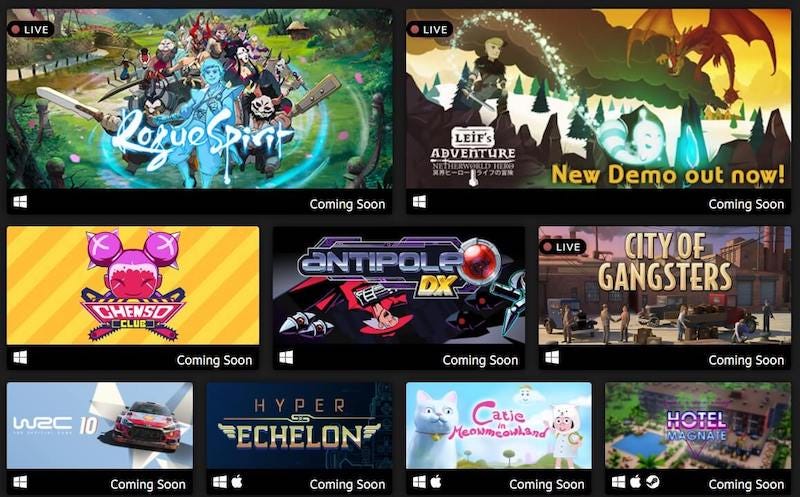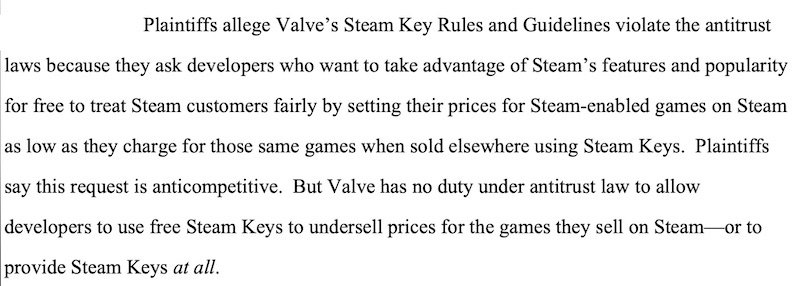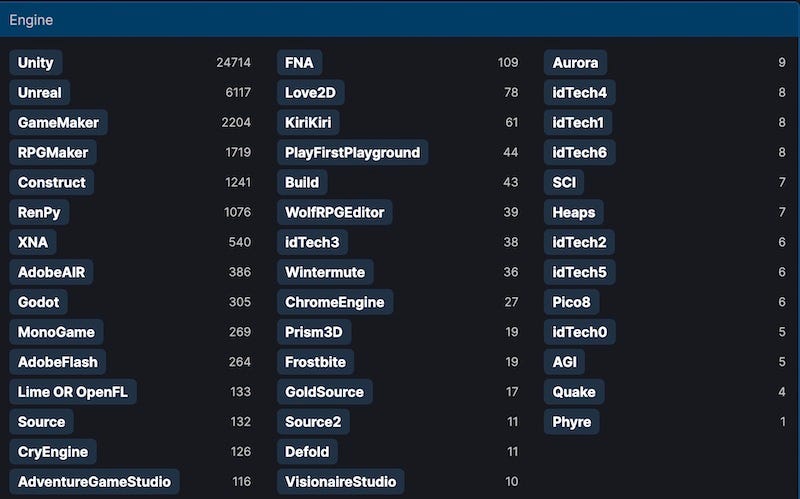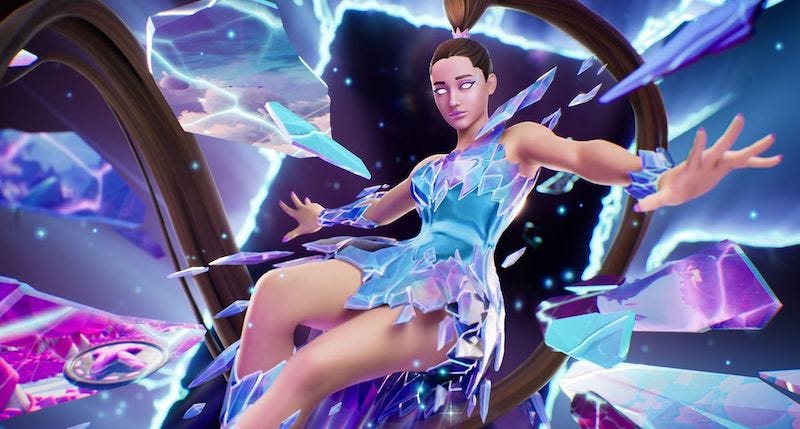Steam demo showcases: officially good for sales!
Publikováno: 9.8.2021
That's the headline of the week, folks.
[The GameDiscoverCo game discovery newsletter is written by ‘how people find your game’ expert & GameDiscoverCo founder Simon Carless, and is a regular look at how people discover and buy video games in the 2020s.]
Welcome back, game discovery travelers, to your shuttle ride from the base hub of DiscoverLand to the outer reaches of the galaxy. We’ll be passing the asteroid fields of Mostly Negative, the black hole of Incented Wishlists, and the gravity well slingshot of Overwhelmingly Positive along the way. Please fasten your seatbelts.
And we start out this week with some news that you might have already heard, but bears some further analysis. Apparently some ‘game demos’ are ‘good for discovery’?
[HEADS UP: If you haven’t, consider subscribing to our Plus tier for a massive ‘state of Steam hits’ weekly exclusive newsletter, member Discord access to talk discovery with colleagues, back-end data access, a game discovery eBook, and more - here’s the full details.]
Steam Next Fest: global stats on how it helps you?
So, thanks to an official Valve blog post crunching the numbers from the first Steam Next Fest in Summer 2020, we now know a few different things:
You definitely get more wishlists, in almost all cases: “the median game saw daily wishlist additions jump 421% during the fest, compared to the two weeks leading up to the event. Wishlisting rates were higher than 421% for half of participating games, while 45% saw a smaller increase, and 5% experienced a decrease in their rate of wishlist additions.” (Somebody pointed out that E3’s virtual showcases were just before this Next Fest. So maybe some of those games account for the outlying 5%?)
In addition, those extra Steam wishlists do convert to more sales after the game releases: “The median released game saw an increase of 292% in "converting wishlists" made during Next Fest compared to converting wishlist additions made in the two weeks leading to Next Fest.”
Oh, and there’s a bonus halo effect, probably thanks to Discovery Queue, streamers and those who got around to playing your demo a little late: “The rate of wishlisting remained elevated for the majority of games even after Next Fest ended, with the median game seeing a 15% increase in daily wishlist additions in the three weeks following Next Fest compared with the two weeks prior to the event.”
So what does this mean? At one point there was some confused discussion in the GameDiscoverCo Plus member Discord about whether each individual wishlist converted 4 times better during Next Fest. Not so.
We checked with Valve’s staff & economist, and they kindly clarified: “If the median game had 100 wishlists made in the period prior to Next Fest that eventually converted, that median game would earn 392 wishlists during Next Fest that eventually convert.” What this implies for wishlist amounts and overall quality during Steam Next Fest 2020 is:
Median wishlist increase of 421%: 100 wishlists (normal); 521 wishlists (Next Fest)
Median wishlist conversion of 292%: 100 wishlists (normal); 392 wishlists (Next Fest)
Conversion rate: 1 (normal); 0.752 (Next Fest)
Our conclusion from this is simple: if you’re getting over 5 times as many wishlists during Next Fest, and they convert 75% as well - you still get nearly 4 times as many eventual buyers? Then Next Fest is great!
This doesn’t guarantee your game’s success, of course: your title could be converting wishlists to sales at tiny numbers on its Steam launch. But at that point, we know your sales issue is probably your game’s inability to convert or find a wide audience, not the fact you had it in a demo showcase.
And this ties in nicely to our current view on demos: take multiple bites at the cherry, because you’ll add interest each time. Next Fest is one of the highest profile chances to showcase demos, because it’s so prominently featured on the platform. (You can also do public Betas, launch new demos alongside pre-launch Steam ‘sale’ features, etc.)
Finally, we’re very interested in wishlist quality if you’re in a Steam pre-launch feature when you don’t have a demo front and center, now we know that 75% is the median Next Fest quality ratio. What ratio could that be? We’re trying to get some individual game data on this, more soon…
Steam vs. Wolfire - the latest antitrust fun & games
In our continued attempts to get Ars Technica to do all our work for us, we Tweeted that Valve's legal response to the Wolfire antitrust suit turned up last week, and basically says: “We have some restrictions on Steam Keys, but we're giving those keys to devs for free anyhow, so deal with it.” And then Valve denies all of the other claims.
Here’s a key segment we identified from Valve’s lawsuit response, which is generally on the spikier side of things:
And luckily, at that point, Ars’ Kyle Orland wrote up a full analysis of the Valve response, which also links directly to a copy of the filing (PDF), should anyone have a wish to read an excess of legal detail. (Thanks, Ars!)
Firstly, the question of how courts should deal with Steam keys as it relates to antitrust is an interesting one. But Valve’s position here seems logical, even if sometimes ‘no, you can’t have your keys!’ can feel arbitrary or restrictive from a Steam dev point of view. And any antitrust court rulings that pertained to Steam keys would surely just lead to Valve stopping giving keys out entirely, which is… surely not a good thing for the ecosystem?
Secondly, there’s a spicier allegation - Valve enforcing pricing parity across PC platforms, even those it doesn’t provide Steam keys for. But as Kyle notes: “Valve, in its response, is not impressed with the factual basis for this allegation, which it says is tied to "a single anecdote of Valve allegedly telling one unnamed developer it shouldn’t give a non-Steam-enabled game free on Discord’s competing platform if it charges Steam users $5 for the Steam-enabled version of that game on Steam." Valve says this "fails to allege market-wide enforcement or plausibly lead to any effect on competition.”
So this is ‘maybe we did it, maybe we didn’t, but even if it’s true in that particular case, it’s not systematic’ from Valve. Which again, has the ring of truth? (We’ve never heard of systematic requests to keep prices flat across Steam, EGS, GOG, etc.)
So.. on the one hand, I deeply appreciate that the U.S. court system allows smaller developers to identify and target potential monopolies. But on the other hand, I wish Wolfire had come with a better argument, because I’m not sure this is going to get anywhere. We’ll see.
(In particular, there’s not a clear if/then remedy for Wolfire’s suit, unlike Epic vs. Apple, where there’s a particular lower priority end goal - ‘Apple’s App Store can’t take a % cut of recurring post-user acquisition payments’ - that the judge seems to be genuinely considering.)
The game discovery news round-up..
And so it’s time to look at miscellaneous platform and discovery news here at the GameDiscoverCo newsletter. And as per normal, there’s quite a lot of it. (Yes, we could run this newsletter daily if we really wanted - but RIP your inboxes, so we’re not doing it!) Anyhow, let’s get to it, as follows:
There’s an unholy team-up from Lars Doucet (GameDataCrunch) and xPaw (SteamDB) to “automatically detect game engines & tech used in all the games on Steam.” Great idea (see pic above)! Here’s the current Beta showing the top engines as Unity (24,700 games), Unreal (6,100 games) and GameMaker (2,200 games.) It’s certainly plausible, if nothing else.
Some PlayStation tidbits for you: putting the PS5’s road to 10 million units into perspective, we discover it’s “selling as fast or faster than some of the most popular consoles of the recent past”, and the $499 version of the PS5 (the one with the disc drive) is no longer being sold at a loss: “It took Sony years to stop losing money on PS3 sales, but the company stopped selling the PS4 at a loss around six months after its debut in 2013.”
It’s a bit of a complicated story, but kudos to my former colleagues at Gamasutra for revealing that going forward, “Unity developers starting new projects will now need either a Unity Pro license or a Preferred Platform License Key to develop” on closed platforms like Xbox, PlayStation, Nintendo Switch, and Google Stadia. But most platforms except Xbox have that License Key. Not sure if this is a squeeze on Xbox or just a Unity loophole closing, but worth keeping an eye on.
There’s been a lot of talk on toxicity and discrimination in the game dev workplace recently, and this GI.biz interview with Games & Online Harassment Hotline’s Jae Lin is particularly good in spelling out the complex nature of the problems - read it: “Saying things like 'we have zero tolerance' or 'that's not our values' or 'we don't allow that to happen here' is actually the easy 'getting out of it' sort of card.”
Microlinks: great piece on why having 10 small games on Steam is way worse than one big game, discovery-wise; the Xbox Cloud Gaming beta on PC is available to Game Pass Ultimate insiders; another hands-on with Steam Deck has a lot of useful detail.
It’s nice to get context for what the biggest games can sell on Nintendo Switch, which are… first-party games! So in the newest Nintendo quarterly results, you’ll see: “The biggest game of this quarter was New Pokémon Snap, which sold 2.07 million units. Other big sellers during the quarter for Nintendo includes Miitopia (1.04 million) and Mario Golf: Super Rush (1.34 million).” Aspirational!
Microlinks 2: there’s a Hubworld ‘Direct’ themed around 3D platforming games on August 29th; we have some alleged new tech info on the second iteration of PlayStation VR; in ‘Itch revenue good!’ news, some games can gross as much as $20,000 on Itch - $ figures are for Caves Of Qud, by the way.
An Epic coda…
Finally, wanted to end this newsletter by highlighting a couple more Epic-related things. Firstly: the Ariana Grande ‘Rift Tour’ concert in Fortnite over the weekend (above pic) was spectacularly good. Here’s a gameplay video, if you didn’t get a chance to check it out. ‘Metaverse done right’, innit? (See, we’re not Epic bashers.)
Secondly, as Epic CEO Tim Sweeney is Tweeting that “because of the court’s protective order we’re just finding out now about Google’s consideration of buying Epic to shut down our efforts to compete with Google Play”, we’ll just point out that:
It’s Epic’s own lawyers who are alleging this, if you read The Verge’s story carefully. (It would be great to see this with full context. Could well be true. But maybe Google also wanted to buy Epic because Fortnite is a smash hit, & Stadia was still being aggressively built out at that point, for example?)
The degree to which we’re veering into ‘billion-dollar company information warfare’ here continues to fascinate. For example, it seems like The Coalition For App Fairness is now fully built out. And the initial documents from Epic paying the PR company to set up the ‘independent association’ shows how it planned to attack dominant app/game platforms using stark language:



But.. all’s fair in love and war? And now Apple is subpoena-ing to get access to internal communications from the expanded Coalition, which also includes companies like Spotify, Match Group and Basecamp, we see? This could run and run…
[We’re GameDiscoverCo, a new agency based around one simple issue: how do players find, buy and enjoy your premium PC or console game? You can subscribe to GameDiscoverCo Plus to get access to exclusive newsletters, interactive daily rankings of every unreleased Steam game, and lots more besides.]




